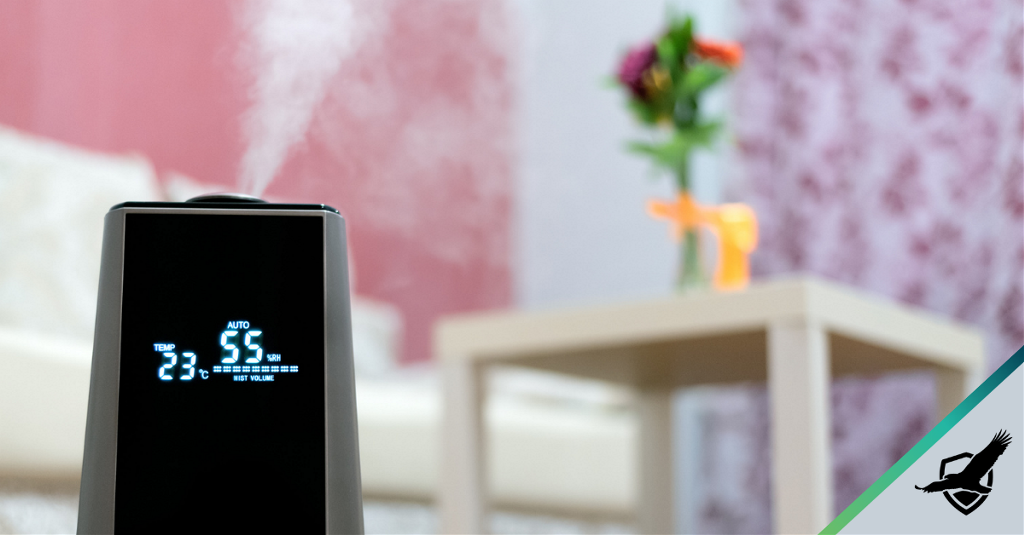Benefits of a Humidifier

There’s a lot to love about winter—cozy evenings by the fireplace, outdoor sports like skiing or ice skating, and that first magical snow of the season. Of course, no one looks forward to cracked lips, dry skin, or catching the flu.
There could be a helpful solution for you, though. A humidifier has the potential to be your key for comfort inside your home.
But what is a humidifier? And what do humidifiers do?
The primary purpose for all humidifiers is to put moisture into the air (aka humidity) through steam or water vapor. The Environmental Protection Agency says the ideal humidity level indoors is between 30 and 50 percent. While levels can go above this happy medium in the summer, they often drop in the winter. A humidifier helps bring those levels into the healthy range. Not sure if a humidifier is right for your home? You can pick up a hygrometer at your local hardware store and measure the humidity in different rooms around the house. You should buy a humidifier if your humidity levels are below 30 percent. The hygrometer will also be a helpful tool throughout the season. It can ensure the humidifier isn’t bringing the humidity levels above 50 percent (which can also be unhealthy).
Humidifier Health Benefits in Colder Months
What are the other benefits of using a humidifier to add moisture to the air? During the winter, it can make a huge difference in how you look, feel, and sleep. Here are some of the most significant benefits a humidifier can offer when it comes to your health:
1. Better skin
Do you apply lip balm and moisturizer throughout the winter? You’re not alone. Our bodies are more than half water, and the dry, cold months love to pull that water right out. A humidifier brings the moisture back to help prevent chapped lips and cracking skin.
2. Reduced risk of infections
Studies have shown that increasing humidity levels to 43% or above reduces an airborne virus’s ability to cause flu infections. Viruses and bacteria don’t travel very well in moist air—and that can mean great news for your health. And, if you do get sick, a humidifier can help you heal faster and reduce coughing and sneezing.
3. Happy sinuses
What do humidifiers do for sinuses? They can help prevent that tight feeling in your nose and also reduce your chances of getting bloody noses. Instead of sniffling, your sinuses should be comfortable and moist.
4. Less snoring
Dry noses and throats are big culprits when it comes to snoring. A humidifier can help your partner get a better night’s sleep.
If you’re thinking about buying your first humidifier, start small with your bedroom. Find a humidifier that covers the square footage of the space and go from there. Larger units can sometimes make a home too moist and don’t completely cover each room. That first small humidifier will give you a better idea of your actual needs. You will also find that some units emit a cool mist while others emit a warm mist. They both serve the same purpose but can vary from there. Parents usually feel more comfortable with a cool mist in their child’s room. Warm mist humidifiers are often quieter and can help heat a room in the winter. They both have pros and cons, so be sure to do your research before buying one.
Why Cleaning Your Humidifier Is Important
and how to do it!
Humidifiers can do a lot of good for your health, but that’s only if you’re committed to keeping them clean. What do humidifiers do if you don’t? They can breed mold, fungus, and bacteria because of dirty reservoirs and filters. A dirty humidifier can trigger asthma and allergies and make healthy individuals feel ill. Your best course of action is to follow the manufacturer’s cleaning guidelines. The Mayo Clinic also offers some more tips:
1. Don’t use tap water.
Only use distilled or demineralized water. There are minerals in tap water that can create deposits that promote the growth of bacteria.
2. Clean the humidifier every three days.
And change the water daily, if possible. You don’t want to give your humidifier a chance to allow film or deposits to develop inside.
3. Use a 3% hydrogen peroxide solution.
That will help wipe out mineral deposits or film (but check to see what the manufacturer says). And rinse the tank well once you’re done cleaning.
4. Change filters.
Swap out filters as often as the manufacturer recommends—and more often if they get dirty.
Don’t underestimate the importance of keeping your humidifier clean. There are some types of home maintenance projects that are easy to put off for days or weeks, but humidifier cleaning is not one of those. If you’re running a humidifier for your health in the winter, it would be silly to make yourself sick because you didn’t focus on the removal of dangerous mold or bacteria.
A humidifier can make your house a comfortable place to live, and home insurance can make sure that comfortable home is protected. Get in touch with your local Pekin Insurance agent to learn more.



